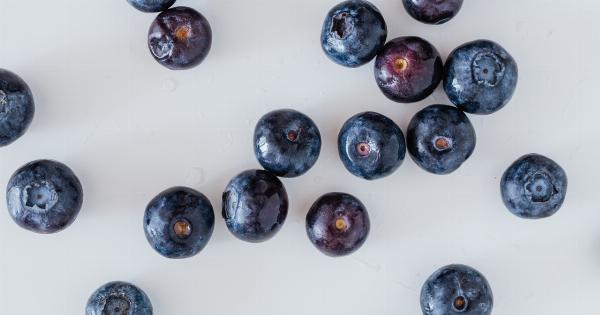Antioxidants are compounds that protect our cells from damage caused by free radicals. Free radicals are molecules produced by our body when it breaks down food or when we are exposed to radiation, tobacco smoke, or air pollution.
Exposure to these free radicals can damage our healthy cells and cause diseases like cancer, Alzheimer’s, and heart disease. The good news is that we can boost our antioxidant consumption by incorporating antioxidant-rich foods into our diet. Here are the top 30 antioxidant-rich foods to add to your diet:.
1. Dark Chocolate
Dark chocolate is not only delicious but also rich in antioxidants. The cocoa in dark chocolate contains flavonoids, which are antioxidants that protect our cells from damage.
The higher the percentage of cocoa in the chocolate, the more flavonoids it contains. Look for chocolate with at least 70% cocoa solids to reap the benefits.
2. Blueberries
Blueberries are one of the most popular antioxidant-rich foods. They are loaded with anthocyanins, which are antioxidants that give them their deep blue color.
Studies have shown that eating blueberries can improve brain function, reduce inflammation, and lower the risk of heart disease and cancer.
3. Artichokes
Artichokes are a great source of antioxidants, fiber, and other nutrients. They contain a compound called cynarin, which stimulates the production of bile in the liver. Bile helps break down fats in the gut and aids digestion.
Artichokes are also low in calories, making them a great addition to a weight-loss diet.
4. Pecans
Pecans are a type of nut that is rich in antioxidants, healthy fats, and fiber. They are also a good source of vitamin E, which is an important antioxidant that protects our cells from damage.
Studies have shown that eating pecans can improve cholesterol levels, reduce inflammation, and lower the risk of heart disease.
5. Strawberries
Strawberries are not only sweet and delicious but also rich in antioxidants. They are loaded with vitamin C, anthocyanins, and other compounds that protect our cells from damage.
Eating strawberries has been linked to improved heart health, reduced inflammation, and lower risk of cancer.
6. Spinach
Spinach is a superfood that is packed with nutrients and antioxidants. It is rich in vitamin C, beta-carotene, and other compounds that protect our cells from damage.
Eating spinach has been linked to improved eye health, reduced inflammation, and lower risk of heart disease and cancer.
7. Red Wine
Red wine is rich in antioxidants called polyphenols, which are found in the grape skins and seeds. Polyphenols have been shown to protect our cells from damage and reduce the risk of heart disease and cancer.
However, it is important to drink red wine in moderation as excess alcohol intake can be harmful to health.
8. Broccoli
Broccoli is a cruciferous vegetable that is loaded with nutrients and antioxidants. It contains a compound called sulforaphane, which has been shown to have anti-cancer properties.
Eating broccoli has also been linked to improved heart health, better digestion, and reduced inflammation.
9. Raspberries
Raspberries are a delicious and nutritious fruit that is loaded with antioxidants. They are rich in vitamin C, anthocyanins, and other compounds that protect our cells from damage.
Eating raspberries has been linked to improved cognitive function, reduced inflammation, and lower risk of cancer.
10. Green Tea
Green tea is a popular beverage that is packed with antioxidants called catechins. Catechins have been shown to reduce inflammation, improve brain function, and lower the risk of heart disease and cancer.
Drinking green tea regularly can also boost metabolism and aid weight loss.
11. Oranges
Oranges are a citrus fruit that is rich in vitamin C, a powerful antioxidant that protects our cells from damage. Eating oranges has been linked to improved immune function, lower risk of heart disease, and better skin health.
Oranges are also a good source of fiber, which aids digestion.
12. Tomatoes
Tomatoes are a popular fruit that is rich in antioxidants, particularly lycopene. Lycopene has been shown to reduce the risk of prostate cancer and lower inflammation.
Eating tomatoes has also been linked to improved heart health and lower risk of stroke.
13. Almonds
Almonds are a type of nut that is rich in antioxidants, healthy fats, protein and fiber. They are also a good source of vitamin E, an important antioxidant that protects our cells from damage.
Eating almonds has been linked to improved heart health, lower cholesterol levels, and better blood sugar control.
14. Carrots
Carrots are a root vegetable that is rich in beta-carotene, an antioxidant that converts to vitamin A in the body. Vitamin A is essential for eye health, immune function, and skin health.
Eating carrots has also been linked to improved heart health and lower risk of cancer.
15. Blackberries
Blackberries are a type of berry that is rich in antioxidants and fiber. They are loaded with vitamin C, anthocyanins, and other compounds that protect our cells from damage.
Eating blackberries has been linked to improved cognitive function, lower inflammation, and better heart health.
16. Garlic
Garlic is a popular herb that is packed with antioxidants and other compounds that benefit our health. It contains a compound called allicin, which has been shown to have anti-cancer properties.
Eating garlic has also been linked to improved heart health, lower cholesterol levels, and better immune function.
17. Sweet Potatoes
Sweet potatoes are a nutritious root vegetable that is rich in beta-carotene, fiber, and other nutrients. Beta-carotene converts to vitamin A in the body and is essential for eye health, immune function, and skin health.
Eating sweet potatoes has also been linked to improved blood sugar control, better digestion, and lower inflammation.
18. Beets
Beets are a root vegetable that is rich in antioxidants, fiber, and other nutrients. They contain a compound called betalain, which gives them their deep red color. Betalain has been shown to have anti-inflammatory and detoxifying properties.
Eating beets has also been linked to improved heart health, lower blood pressure, and better exercise performance.
19. Cinnamon
Cinnamon is a popular spice that is loaded with antioxidants and other compounds that benefit our health. It has been shown to lower inflammation, improve blood sugar control, and lower cholesterol levels.
Adding cinnamon to your diet can also improve digestion and boost immune function.
20. Grapes
Grapes are a fruit that is rich in antioxidants, particularly resveratrol. Resveratrol has been shown to have anti-cancer properties and improve heart health.
Eating grapes has also been linked to improved brain function, lower inflammation, and better digestion.
21. Kale
Kale is a leafy green vegetable that is packed with nutrients and antioxidants. It is rich in vitamin C, beta-carotene, and other compounds that protect our cells from damage.
Eating kale has been linked to improved eye health, lower inflammation, and reduced risk of cancer.
22. Avocado
Avocado is a fruit that is rich in healthy fats, fiber, and antioxidants. It contains a compound called glutathione, which has been shown to have anti-cancer properties and protect our cells from damage.
Eating avocado has also been linked to improved heart health, better cholesterol levels, and lower inflammation.
23. Red Bell Pepper
Red bell pepper is a vegetable that is rich in vitamin C, an important antioxidant that protects our cells from damage. It also contains other antioxidants like lutein and zeaxanthin, which are important for eye health.
Eating red bell pepper has been linked to improved immune function, better digestion, and lower risk of cancer.
24. Turmeric
Turmeric is a spice that is rich in antioxidants and other compounds that benefit our health. It contains a compound called curcumin, which has been shown to have anti-inflammatory and anti-cancer properties.
Adding turmeric to your diet can also improve brain function and aid weight loss.
25. Cranberries
Cranberries are a type of berry that is rich in antioxidants, particularly anthocyanins. Anthocyanins have been shown to have anti-inflammatory properties and protect our cells from damage.
Eating cranberries has also been linked to improved urinary tract health and lower risk of infection.
26. Walnuts
Walnuts are a type of nut that is rich in antioxidants, healthy fats, protein, and fiber. They are also a good source of alpha-linolenic acid (ALA), an omega-3 fatty acid that is essential for brain health.
Eating walnuts has been linked to improved heart health, better cholesterol levels, and reduced inflammation.
27. Pumpkin
Pumpkin is a winter squash that is rich in beta-carotene, fiber, and other nutrients. It also contains other antioxidants like alpha-carotene and vitamin C.
Eating pumpkin has been linked to improved eye health, better digestion, and lower risk of cancer.
28. Apples
Apples are a fruit that is rich in antioxidants, particularly flavonoids. Flavonoids have been shown to have anti-inflammatory and anti-cancer properties.
Eating apples has also been linked to improved heart health, better digestion, and lower risk of dementia.
29. Coffee
Coffee is a popular beverage that is rich in antioxidants, particularly chlorogenic acid. Chlorogenic acid has been shown to reduce inflammation, improve brain function, and lower the risk of heart disease and diabetes.
Drinking coffee in moderation can also boost metabolism and aid weight loss.
30. Red Cabbage
Red cabbage is a cruciferous vegetable that is rich in antioxidants, particularly anthocyanins. Anthocyanins have been shown to have anti-inflammatory properties and reduce the risk of cancer.
Eating red cabbage has also been linked to improved digestive health, lower inflammation, and better heart health.


























